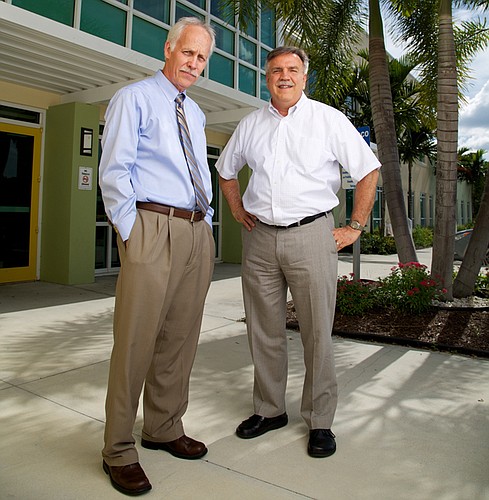- December 25, 2024
-
-
Loading

Loading

Government's hand is impacting every part of the health care industry.
One small corner feeling government's reach is behavioral health, which includes mental health and substance abuse treatment.
Uncertainty in state government funding and changes mandated by Obamacare are forcing behavioral health care organizations to change the way they do business by consolidating. One recent example: Lee Mental Health and Southwest Florida Addiction Services are merging to form SalusCare in Lee County.
Similar mergers are occurring elsewhere in Florida, too. For example, three behavioral-health organizations in the Tampa Bay region have agreed to form Gracepoint Management Inc. In Orlando, another three behavioral-health companies are forming Aspire Health Partners.
“There's a lot of uncertainty in our industry about funding,” says Kevin Lewis, president and CEO of SalusCare, who travels to Tallahassee regularly to lobby for state funding. Only 11% of the combined organization's revenues are from private-paying patients.
Ironically, it was a government-funding issue that split Lee Mental Health and Southwest Florida Addiction Services in 1980. At the time, the state underfunded the alcohol-treatment program at Lee Mental Health and it nearly closed until a group of citizens formed Southwest Florida Addiction Services, a separate non-profit organization.
Mental health and substance abuse often go hand in hand, but they've been treated separately for years. Now, as research shows overlaps between the two ailments, there is a medical reason to combine them.
But the financial pressures of government funding, insurance reimbursements, competition and changes in health care laws are forcing mergers. What's more, larger health care organizations can better absorb high expenses such as technology and can negotiate from a stronger position for insurance reimbursements and government funding.
For example, the requirement to adopt electronic medical records at Southwest Florida Addictions Services could cost $1 million, says Lewis. The substance-abuse treatment center posted $157,976 in net income in the tax year ending June 30, 2012, so such an expense would be cost-prohibitive.
But Lee Mental Health already has spent that amount for its own medical-record system over time, so Southwest Florida Addiction Services will adopt that system as it combines to form SalusCare. Both organizations have shared information technology staff prior to the merger.
While both organizations are non-profits, they still operate on thin margins. According to the last tax returns, Lee Mental Health posted $118,932 in net income on total revenues of $19.4 million. Southwest Florida Addition Services reported net income of $157,976 on revenues of $6.8 million.
The combined organization has no plans to lay off employees or close any of its seven facilities, but SalusCare will benefit from reducing the number of duplicative expenses. For example, the chief financial officer of Southwest Florida Addiction Services recent retired and won't have to be replaced.
To grow revenues, SalusCare plans to make a big push to provide more outpatient services. “Outpatient therapy is a huge area of opportunity,” says David Winters, the chief administrative officer at SalusCare, noting that 5% annual growth in outpatient programs is a conservative estimate.
While there's uncertainty in future reimbursement schemes, government is considering paying for alcohol and mental-health treatment the same as other diseases (it currently pays less for such treatment). In addition, hospitals will be rewarded for moving patients out of costly facilities and into outpatient programs, benefiting SalusCare.
Lewis says he's had ongoing discussions with Lee Memorial Health System and Park Royal Hospital about establishing cooperative agreements to transfer patients among them. “Our eye is on the future,” Lewis says.